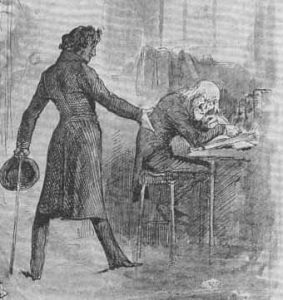
The new year brings annual habits. Some of my friends are already eating crow about their promises to eat less, workout more and save somewhere in between. Others are still writing cheques (remember them?) with 2017 in the date box. Me? Well, I ran into my annual problem, especially at the franchise stationery shop.
“Do you have any ledgers?” I asked the clerk.
“You mean like lined-paper ledgers?” she said as if I had just asked her to fix my typewriter, give me a roll of pennies or fill ’er up. Then, she shook her head unsympathetically and I realized this was a no-go.
Yes, I said “ledger.” You know those big flip-open, blue-covered books that allow you to fill all those columns with daily, commercial entries and at the bottom of each column, total up your profits and losses? Remember, in the Christmas movies we watched a couple of weeks ago, as Ebenezer Scrooge sat hunched over his desk, scratching his ink quill across the pages of his accounting ledger? That’s what I’m talking about.
Now, I have moved beyond the ink quill, but as a lifelong freelancer (i.e. small business person) I’d always used the shoe-box method of accounting, until Brian Mulroney came along; in 1991, when the then prime minister brought in the Goods and Services Tax (GST), overnight I became a part-time accountant, submitting quarterly profit-and-loss statements to Revenue Canada. That’s when I started using a ledger book, a new one every year.
Which was fine until computers, digital and the internet made ledgers obsolete. However, as an old dog, bound and determined to abide by my methods of accounting, each New Year’s I’ve gone searching for a paper ledger. This year, for some reason, was particularly difficult. I mentioned my problem to a friend, a couple of weeks ago, and she pointed out that when her family ran an orchard in what is now Mississauga, she remembered her grandfather’s ledger. It was a kind of history of what raw materials were required to run the farm, how much they cost, and ultimately how the apple operation fed her family. At one point, she said she remembered seeing an extraneous entry in the ledger.
“This day a baby boy born,” the ledger read, revealing her grandfather’s noting the day a son (my friend’s father) was born. So, for her, the farm ledger was a diary of two generations before her, a living history on a ledger page.
As a kid, I remember when my parents had a hobby farm (instead of a cottage) up in what is now the City of Kawartha Lakes region. For a few years, each spring, I planted thousands of Christmas trees there with the intention of harvesting them. Never did. Now there’s a mature forest there. Anyway, one of my favourite outings was a weekly trip to the village of Bethany to do our weekly shopping at the general store (I think run by the Reid family).
It truly was an all-purpose general store with everything from soup to nuts in stock. And all along the counter, the Reids kept mini-ledgers for each family who wanted to run an account for several visits and then square up at the end of the month. The commerce of Bethany was all documented right there in those general store ledgers. How civilized, eh?
A ledger of another kind came in very handy once in the early days of my military history research and writing. Every pilot I’ve ever known keeps what’s called a flight log. And like a ledger, the pilot enters every flight on a single line across the ledger left-to-right noting the date, aircraft registration, purpose of the flight, and total time in the air. A wartime log today is worth its weight in gold for historians.
Once, when interviewing RCAF fighter pilot Charley Fox, I noticed a red check mark at the end of the entry for July 17, 1944. When I probed Charley, he revealed that was the day he strafed an open-top, German staff car on a road in France. The officer turned out to be Erwin Rommel, Hitler’s field marshal in France. What a story I got from Charley … thanks to his flight ledger.
Now, you’re probably wondering, did Barris ever find his ancient ledger? Sure did. After giving up on all the usual locations, I happened to pass a shop in Toronto that specialized in writing paper, handmade cards and such. As I walked in I suddenly noticed on the counter behind the cash register lay a huge, open ledger with pencil entries in it.
“You use a ledger?” I exclaimed.
“Always have,” the proprietor said and she directed me to where I could find exactly the kind of ledger I needed. Someday, somebody (certainly not Brian Mulroney) will thank me and my antiquated ledgers for my dedication. For nearly 30 years, I’ve been doing my bit for the economy, line by line, in a paper ledger.